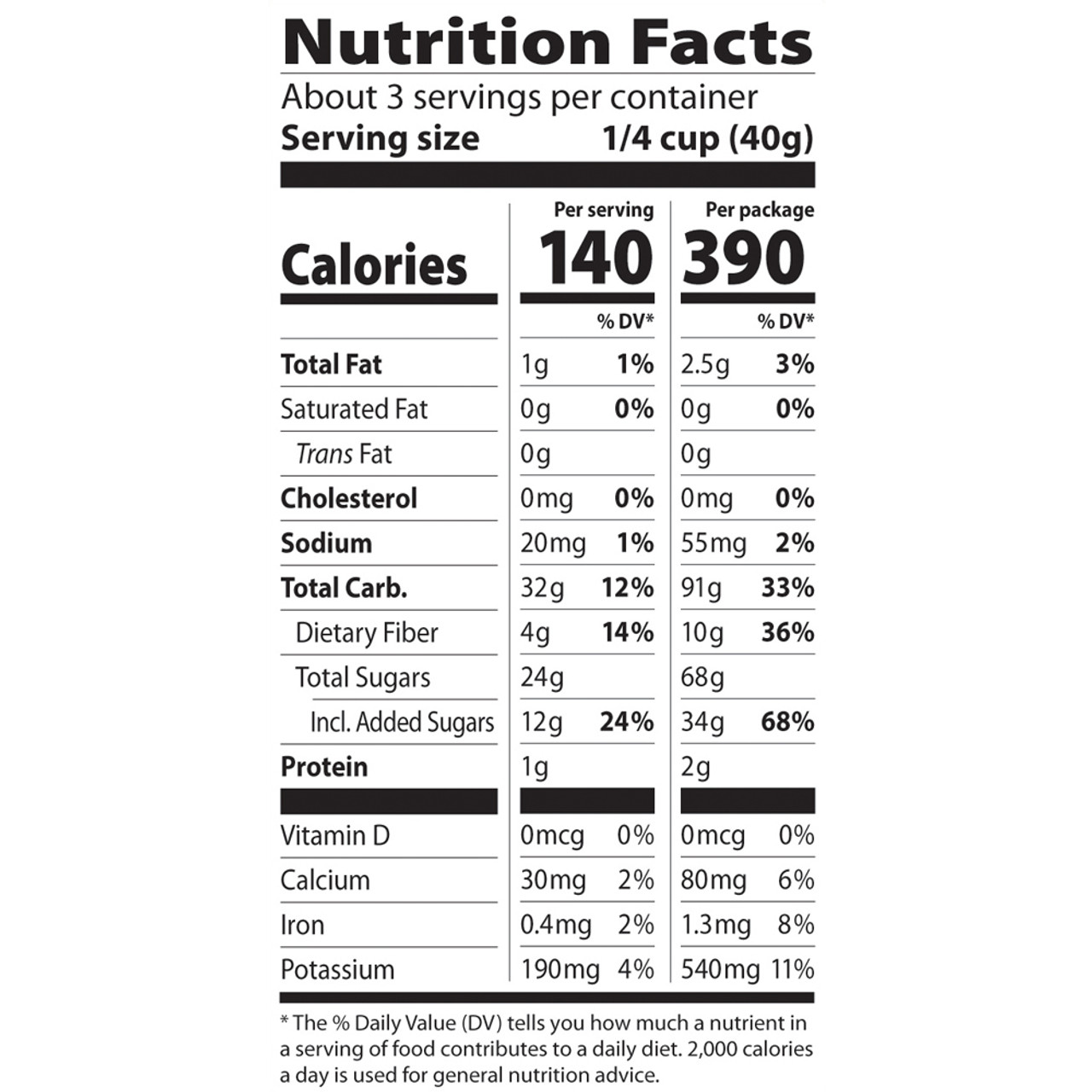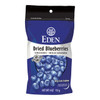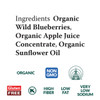Wild lowbush organic blueberries, picked, infused with organic apple juice concentrate, and slowly dried before misting with organic sunflower oil to prevent clumping. No refined sugar, sulfites, or preservatives. Very low sodium with no salt added, and low fat. The USDA's number-one rated source of beneficial antioxidants among 20 fruits rated. Easy to keep at hand when on the go, at school, work, or home. Include them in making desserts, pastries, breads, granola, popcorn balls, muesli, hot cereal, as a salad garnish, or whatever your imagination comes up with. Reclosable standing pouch. ![]()
MORE DETAILS
Organic Eden Wild Blueberries are from lowbush, wild grown blueberry fields, called 'barrens', in northern Quebec, Canada that have been organically managed since 1996. The area was once heavily forested, but the forest was long ago cut down. A few years after it was cleared, the area was full of native wild blueberries. In August the blueberries are picked, washed and cleaned to remove any leaves and twigs, sorted and quick frozen. When ready for drying, the blueberries are thawed and then infused by immersing them in organic apple juice concentrate that is circulated over them until they reach just the right sweetness or 'Brix'. The infused blueberries are then rinsed, low heat dried, and coated very lightly with a mist of organic sunflower oil to prevent clumping. The low heat drying is warm air circulated until they are dry enough to become shelf stable, requiring no refrigeration. It takes 4 pounds of fresh blueberries to produce 1 pound of dried.
Eden Wild Blueberries are a delicious and nutritious food, packaged in convenient re-sealable pouches that lock in their flavor, freshness, and valuable nutrients.
Although there are more than 450 plants in the blueberry family Vaccinium, there are a few main types of blueberry plants indigenous to North America - the wild, low bush, sweet blueberry plant, Vaccinium angustifolium, two high bush varieties used for cultivated blueberry plants, Vaccinium corymbosum and Vaccinium ashei, and the sour variety of New England, Vaccinium myrtilloides. The wild blueberry is native to northeastern North America growing from Minnesota to Maine and as far north as the Arctic. For the most part this variety is confined to growing in this cooler climatic area. The wild blueberry is a small, dwarf plant reaching only the height of 1 to 2 feet. The cultivated blueberry is a much taller bush planted in many different areas, and are maintained much like an olive grove or an orchard. Wild blueberry plants are not planted. They develop naturally from native existing stands and are simply managed. Although both types of blueberries contain antioxidants, it is the wild, low bush blueberry that was recently rated #1 in antioxidant activity by the USDA. To determine the antioxidant activity of various foods, the USDA uses a system referred to as Oxygen Radical Absorbance Capacity (ORAC). By testing the ability of foods and other compounds to subdue oxygen free radicals, the USDA was able to determine each compound's antioxidant capability. The ORAC value of wild blueberries is 2,400, the highest of 20 common fruits rated.
For centuries wild blueberries were gathered from the fields, forests and bogs of North America by Native American tribes. These tiny berries were a valuable food source used in stews, soups, cooked with ground corn and sweetened with maple syrup or honey, and made into a type of jerky with deer meat, which helped many survive the long, cold northern winters. The blossom end or calyx of each berry forms the shape of a perfect five pointed star. Native Americans called it the 'star berry', and the elders of the tribe often told stories of how the Great Spirit brought the 'star berries' so that the children could relieve their hunger during a famine. They used the juice of the berries to ease what they called 'old coughs', and to dye rugs, blankets, and clothing. They also made smoked berries, sun dried berries, and blueberry powder to flavor meats. They even used the leaves and roots to make teas. When the Pilgrims arrived, the Native Americans taught them how to grow and use native plants to help them survive. One such plant was the wild blueberry. They taught them how to sun dry and store them for the winter. Over time the berries became an important food source for the early settlers.
Unlike most commercial dried fruit, Eden Wild Blueberries contain no added refined sugar or high fructose corn syrup. We use NO sulfites, chemical preservatives, or additives of any kind.
Eden Wild Blueberries are a delicious, healthy snack that are great for lunches, camping, hiking or just a real good snack anytime. There's no need to limit them to mere snacking though. Use Eden Wild Blueberries in cakes, scones and muffins, in pie fillings and puddings, in grain and bread stuffing, in hot cereals or on cold cereals. They can also be used in making homemade granola, granola bars, popcorn balls and caramel corn.


















